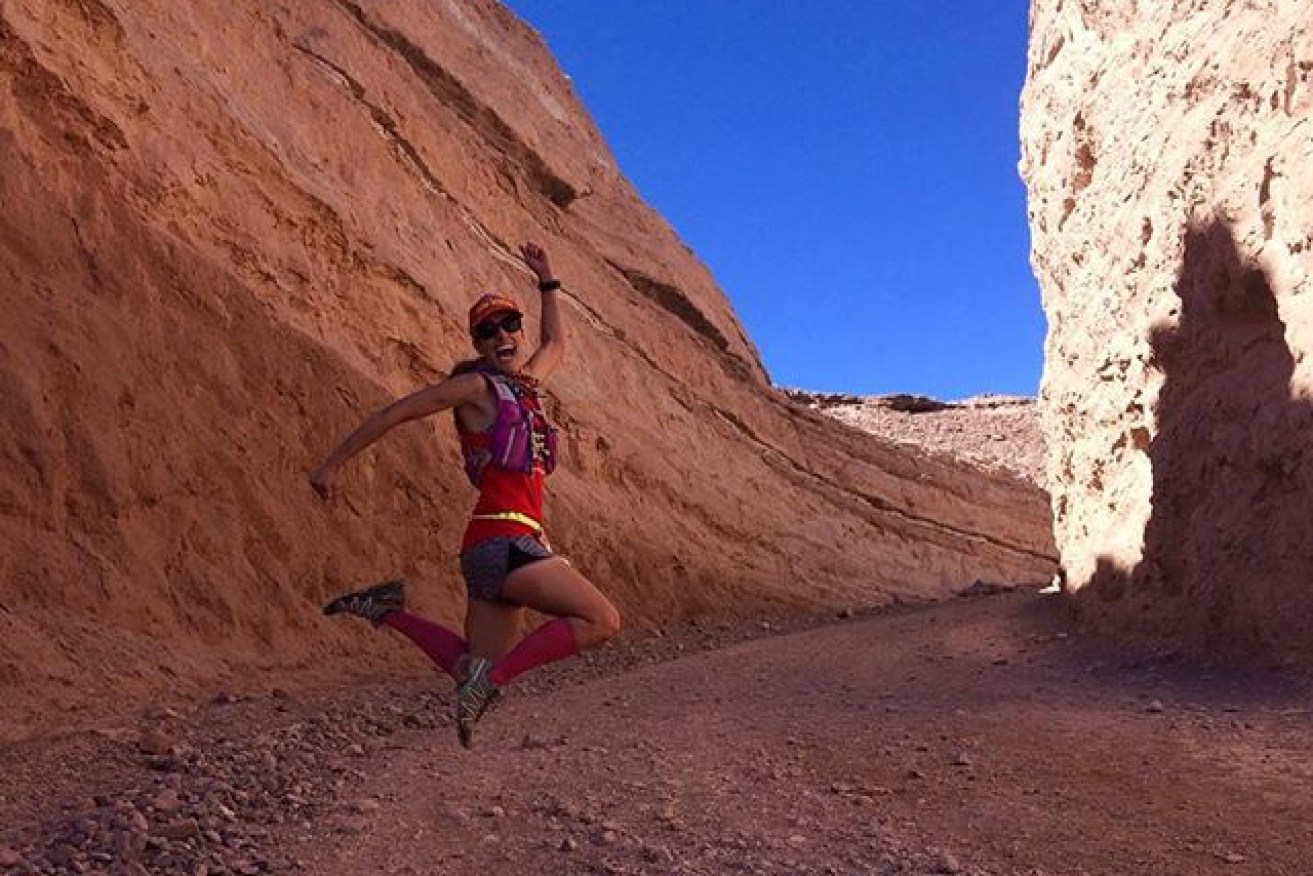From ovarian cancer to ultra-marathons: One woman’s long journey

Ovarian cancer survivor and ultra-marathon runner Heather Hawkins takes on Chile's Volcano Marathon. Photo: Instagram
It started as a light-hearted challenge between mums watching their kids one weekend at Nippers and will culminate in a Sydney mother taking on the hardest ultra-marathon in the world.
Heather Hawkins will run in the 2018 Marathon Des Sables – known as the world’s toughest foot race – to raise money and awareness for Ovarian Cancer Australia. The gruelling physical and mental 10-day test across 250 kilometres of the Sahara begins on April 8.
Even getting to the start will be quite the journey for a woman who was diagnosed with ovarian cancer 11 years ago.
“I hadn’t run since primary school,” Ms Hawkins, 52, says. “In high school I played a bit of hockey. Otherwise I did nothing, except for a bit of aerobics wearing lots of Lycra in the ‘80s.”
A post shared by Heather Hawkins (@heather_adventurousspirit) on
Eleven years ago, Ms Hawkins’ “contentedly unadventurous” life was turned upside down. At Christmas 2006, she noticed her abdomen had started to swell.
“I had heavier periods and this absolute fatigue that I’d never experienced before,” she says.
For a while, Ms Hawkins ignored the symptoms, putting them down to the demands of her busy life. But by late February she was concerned.
“When the symptoms persisted, particularly in those weeks when I didn’t have my period and I was still feeling bloated and needing to go to the loo to urinate a lot, alarm bells started to ring,” she says.
She went to see her family doctor, who sent her for a CT scan. Ms Hawkins, then 41, was diagnosed with stage one ovarian cancer.
“I had surgery within 10 days,” she says. “The gynaecological surgeon … removed an 18-centimetre tumour and I had a full hysterectomy.”
Afterwards, Ms Hawkins chose a non-invasive surveillance program over chemotherapy. She also embarked on a fitness regime, starting with earning her bronze surf-lifesaving medallion (spurred by that weekend challenge between mums) and then the four-kilometre Mother’s Day Classic.
“It was part way through that run that I looked out at the harbour and I thought ‘I love running, this is something new, and this is not my last race that I’ll do, it’s the beginning, and I love it that I feel strong and that I’m not defined by cancer’,” she says.
“I finished that race thinking ‘what else can I do now?’.”
She signed up for more events, each longer than the last: Sydney’s City2Surf, a half-marathon and the Sydney Marathon. That led to marathons around the world and then trekking 1700 kilometres in the thin air of Nepal’s Great Himalaya Trail, the North Pole Marathon and the World Marathon Challenge.
With each event, Ms Hawkins raises money for cancer research. She considers herself extremely fortunate to have detected her own cancer before it had spread to her other organs.
“I want women to be aware of the symptoms, to know that it can be found earlier,” she says.
In Australia last year, 1600 women were diagnosed with ovarian cancer. Ovarian Cancer Australia chief executive Jane Hill says the disease has the lowest survival rate of any women’s cancer, well below the average for all cancers.
Only 44 per cent of women diagnosed with ovarian cancer will survive five years post-diagnosis. In comparison, the overall five-year survival rate for women diagnosed with breast cancer is 90 per cent.
“If found in its early stages, women have an 80 per cent chance of being alive well after five years,” Ms Hill says. “Unfortunately, 75 per cent of women are diagnosed in advanced stages.”
There are recognised treatments for ovarian cancer but no early detection test for it.
In January, researchers from John Hopkins University and Melbourne’s Walter and Eliza Hall Institute announced they had developed a blood test that can identify DNA and proteins leaked into the bloodstream by cancer cells before symptoms show. Called CancerSEEK, the test can indicate the presence of several cancers, including ovarian.

A new blood test offers the promise of early detection of some cancers. Photo: Getty
Ms Hill says CancerSEEK is an interesting development, but more work is needed before it can be adopted for clinical use.
“We will be looking to the results of a larger, five-year validation study including individuals without a cancer diagnosis, which is now underway in the US, to demonstrate CancerSEEK’s accuracy and efficacy as a screening test,” she says.
In the meantime, Ms Hill wants all women to be aware of the symptoms of ovarian cancer. “It may just save your life, or the life of someone you love,” she says.
Four key symptoms of ovarian cancer:
- Abdominal or pelvic pain
- Increased abdominal size or persistent bloating
- The need to urinate often or urgently
- Feeling full after eating a small amount
Ovarian Cancer Australia’s Teal Ribbon Day is February 28. To learn more, visit ovariancancer.net.au.








